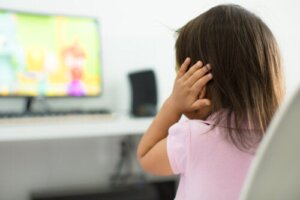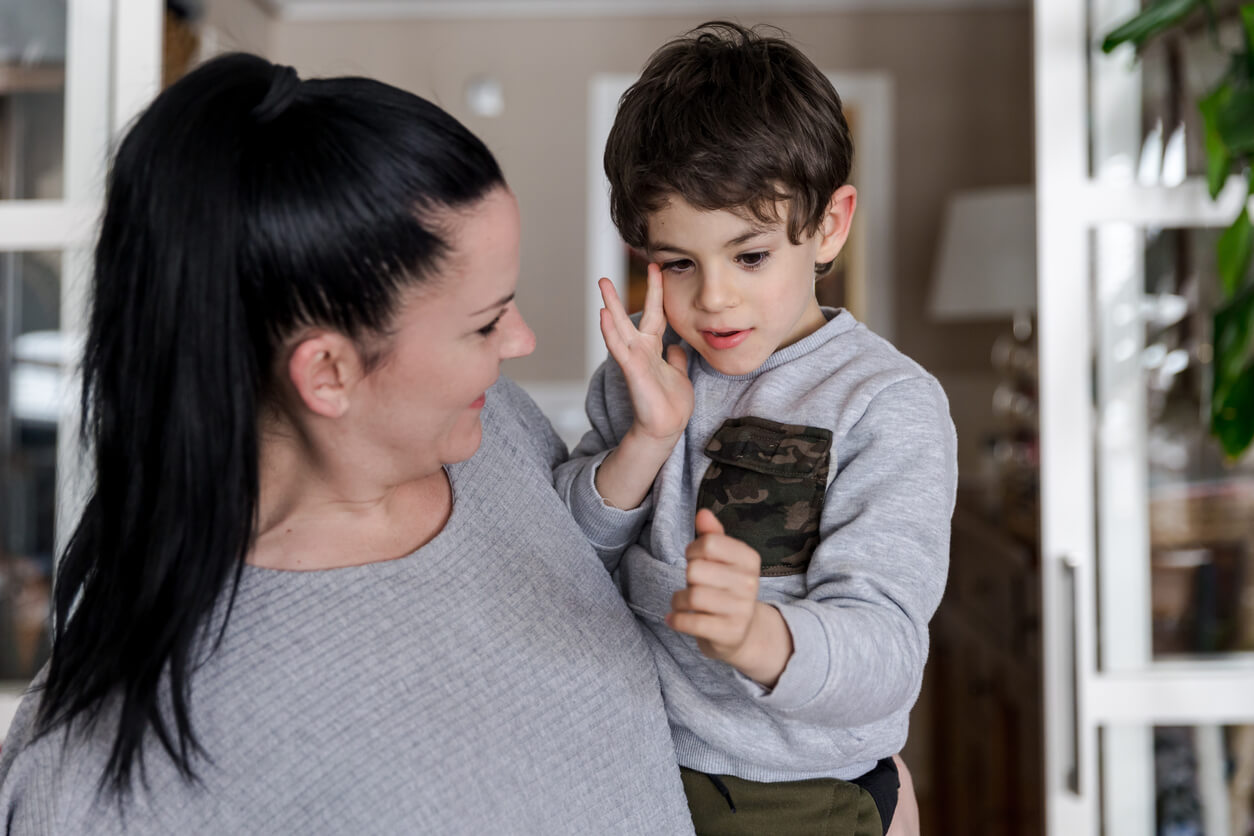When a Family Doesn't Accept a Child's Autism Diagnosis


Written and verified by the psychologist Elena Sanz Martín
As a society, we’re becoming more and more aware of neurodiversity and we know more about conditions such as autism. However, there are still many myths, and not all of us have the necessary information to understand this reality. Sometimes, it’s normal that when a child receives an autism diagnosis, the family denies it, doesn’t accept it, or downplays its importance.
Although this is an understandable reaction, the truth is that it can be very harmful if it’s maintained over time. First, the child needs parents who know how to understand and respond to their needs. And second, this attitude can deprive them of the necessary support they need to develop their potential.
Therefore, we want to explore the importance of accepting an autism diagnosis and offer some guidelines in this regard.
Why doesn’t the family accept their child’s autism diagnosis?
Often, it’s the parents themselves who can’t accept their child’s autism diagnosis. This is due to several factors that we’ll tell you about below.

Dealing with an unknown reality
First of all, parents experience the vertigo of having to face an unknown and unexpected reality that puts an end to the hopes and dreams they’d projected for that child. To a certain extent, we could say that a mourning process is triggered.
Facing fears
At the same time, it’s also due to the various fears that arise once the news is known. For example, the fear of not knowing how to be up to the task, of not being able to care for and accompany the child’s needs adequately, or that one’s own life and that of the child will consist of constant suffering (as this is the image we often have of autism). And, above all, the fear of rejection, misunderstanding, and mockery from the environment.
Faced with this accumulation of emotions, which are undoubtedly difficult to process, denying the diagnosis can be a defense and coping mechanism.
Misinformation and associated myths
In addition, there are other reasons that contribute to the denial of an autism diagnosis by the family. For example, misinformation and myths associated with autism can lead to the belief that it’s something transitory, that it’s really not that serious, and that it will disappear over the years.
These types of insinuations and beliefs are often strongly held by close family, who may recommend all kinds of cures to parents and downplay the child’s neurodivergence.
The truth is that there are various therapies that can help children on the autism spectrum to improve their well-being and functioning. However, there’s no cure because we’re not dealing with a disease, but a different way of being and perceiving the world that deserves understanding and respect.
What are the consequences of denying an autism diagnosis?

Many times, when the family refuses to accept the diagnosis of autism in a child, grandchild, or nephew, they do so with the best of intentions. They think it’s a way to normalize it, reduce its drama, and even show support. However, the truth is that this isn’t the way to address the situation.
If we really want to contribute to the child’s well-being, the goal isn’t to pretend that the child’s condition doesn’t exist, but quite the opposite. We must strive to understand diversity and learn to respond to their needs, without expecting them to change in order to fit into the world. When we refuse to accept the diagnosis, several consequences occur:
- We turn our backs on a reality that needs attention. Therefore, we don’t seek to become informed, get to know our child, and open our minds to the child’s experiences. Therefore, we’re not able to understand them, and this can hinder communication and bonding.
- We expect the condition to reverse itself at some point. Therefore, we don’t accept the child as they are, but wish that they would change and become what we expect of them. This lack of acceptance may be perceived by the child and cause them harm.
- We refuse to ask for or receive the help the child needs. Early intervention, based on behavioral techniques and educational and learning programs, can help improve reasoning, communication, interaction with parents, and other areas. Similarly, speech therapy, occupational therapy, or pharmacological intervention may be necessary.
- We overlook their particular needs. Children with autism may be overwhelmed by highly stimulating environments, novel social situations, unexpected changes, or language that isn’t very direct. If we pretend that nothing’s going on, we won’t be interested in facilitating their daily life, which may cause them suffering.
Accepting an autism diagnosis in a child in order to move forward
In short, it’s understandable that receiving an autism diagnosis in the family produces fears and doubts. Therefore, it’s crucial to consult with professionals who can guide and even accompany the parents in their personal process.
However, the best thing you can do for your child is to accept their diversity, not to try to change them, but at the same time, not pigeonhole them into labels either. Each child with autism is different and presents different abilities and difficulties.
Accepting the diagnosis will allow you to approach your child in a genuine way, be interested in understanding and getting to know them, and look for information and support to help them develop their potential and lead a full and happy life.
As a society, we’re becoming more and more aware of neurodiversity and we know more about conditions such as autism. However, there are still many myths, and not all of us have the necessary information to understand this reality. Sometimes, it’s normal that when a child receives an autism diagnosis, the family denies it, doesn’t accept it, or downplays its importance.
Although this is an understandable reaction, the truth is that it can be very harmful if it’s maintained over time. First, the child needs parents who know how to understand and respond to their needs. And second, this attitude can deprive them of the necessary support they need to develop their potential.
Therefore, we want to explore the importance of accepting an autism diagnosis and offer some guidelines in this regard.
Why doesn’t the family accept their child’s autism diagnosis?
Often, it’s the parents themselves who can’t accept their child’s autism diagnosis. This is due to several factors that we’ll tell you about below.

Dealing with an unknown reality
First of all, parents experience the vertigo of having to face an unknown and unexpected reality that puts an end to the hopes and dreams they’d projected for that child. To a certain extent, we could say that a mourning process is triggered.
Facing fears
At the same time, it’s also due to the various fears that arise once the news is known. For example, the fear of not knowing how to be up to the task, of not being able to care for and accompany the child’s needs adequately, or that one’s own life and that of the child will consist of constant suffering (as this is the image we often have of autism). And, above all, the fear of rejection, misunderstanding, and mockery from the environment.
Faced with this accumulation of emotions, which are undoubtedly difficult to process, denying the diagnosis can be a defense and coping mechanism.
Misinformation and associated myths
In addition, there are other reasons that contribute to the denial of an autism diagnosis by the family. For example, misinformation and myths associated with autism can lead to the belief that it’s something transitory, that it’s really not that serious, and that it will disappear over the years.
These types of insinuations and beliefs are often strongly held by close family, who may recommend all kinds of cures to parents and downplay the child’s neurodivergence.
The truth is that there are various therapies that can help children on the autism spectrum to improve their well-being and functioning. However, there’s no cure because we’re not dealing with a disease, but a different way of being and perceiving the world that deserves understanding and respect.
What are the consequences of denying an autism diagnosis?

Many times, when the family refuses to accept the diagnosis of autism in a child, grandchild, or nephew, they do so with the best of intentions. They think it’s a way to normalize it, reduce its drama, and even show support. However, the truth is that this isn’t the way to address the situation.
If we really want to contribute to the child’s well-being, the goal isn’t to pretend that the child’s condition doesn’t exist, but quite the opposite. We must strive to understand diversity and learn to respond to their needs, without expecting them to change in order to fit into the world. When we refuse to accept the diagnosis, several consequences occur:
- We turn our backs on a reality that needs attention. Therefore, we don’t seek to become informed, get to know our child, and open our minds to the child’s experiences. Therefore, we’re not able to understand them, and this can hinder communication and bonding.
- We expect the condition to reverse itself at some point. Therefore, we don’t accept the child as they are, but wish that they would change and become what we expect of them. This lack of acceptance may be perceived by the child and cause them harm.
- We refuse to ask for or receive the help the child needs. Early intervention, based on behavioral techniques and educational and learning programs, can help improve reasoning, communication, interaction with parents, and other areas. Similarly, speech therapy, occupational therapy, or pharmacological intervention may be necessary.
- We overlook their particular needs. Children with autism may be overwhelmed by highly stimulating environments, novel social situations, unexpected changes, or language that isn’t very direct. If we pretend that nothing’s going on, we won’t be interested in facilitating their daily life, which may cause them suffering.
Accepting an autism diagnosis in a child in order to move forward
In short, it’s understandable that receiving an autism diagnosis in the family produces fears and doubts. Therefore, it’s crucial to consult with professionals who can guide and even accompany the parents in their personal process.
However, the best thing you can do for your child is to accept their diversity, not to try to change them, but at the same time, not pigeonhole them into labels either. Each child with autism is different and presents different abilities and difficulties.
Accepting the diagnosis will allow you to approach your child in a genuine way, be interested in understanding and getting to know them, and look for information and support to help them develop their potential and lead a full and happy life.
All cited sources were thoroughly reviewed by our team to ensure their quality, reliability, currency, and validity. The bibliography of this article was considered reliable and of academic or scientific accuracy.
- Agency for Healthcare Research and Quality. (2014). Tratamientos para niños con trastorno del espectro autista. Effective Health Care Program. https://effectivehealthcare.ahrq.gov/products/autism-update/espanol
- Martinez, M. Á., & Bilbao, M. C. (2008). Acercamiento a la realidad de las familias de personas con autismo. Psychosocial Intervention, 17(2), 215-230.
This text is provided for informational purposes only and does not replace consultation with a professional. If in doubt, consult your specialist.








